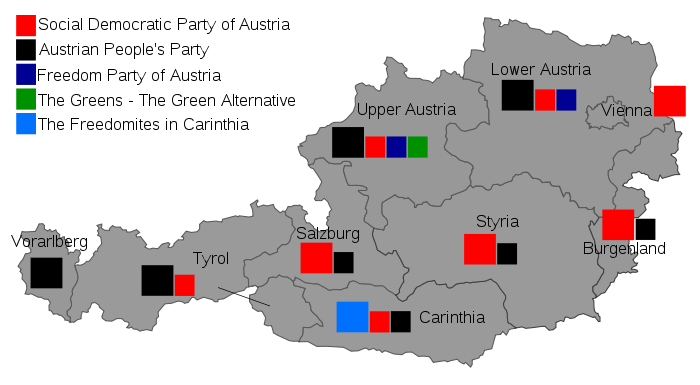- Distribution of seats in the Austrian Landtage
-
Austria 
This article is part of the series:
Politics and government of
AustriaConstitutionExecutive- President (List)
- Federal Government
- Chancellor (List)
- Vice-Chancellor
- Cabinet
Decentralized gov't- States (Länder)
- Landtage
- Districts
Foreign policy
Eight political parties are represented in the Landtage legislative assemblies of the nine Austrian states. Currently the Austrian People's Party (ÖVP), the Social Democratic Party of Austria (SPÖ) and The Greens are represented in all state diets, while the Freedom Party of Austria (FPÖ) lost its seats in the Styrian state election of 2005. The Freedom Party in Carinthia (FPK) forms a common faction with the FPÖ in the National Council of Austria.
Seats ÖVP SPÖ FPÖ Greens FPK FRITZ KPÖ LBL Election duration Last Election Next election Source Burgenland 36 13 18 3 1 1 5 years 2010 2015 [1] Carinthia 36 6 11 1 17 5 years 2009 2014 [2] Lower Austria 56 31 15 6 4 5 years 2008 2013 [3][4] Upper Austria 56 28 14 9 5 6 years 2009 2015 [5][6] Salzburg 36 14 15 5 2 5 years 2009 2014 [7] Styria 56 24 25 3 4 5 years 2005 2010 [8] Tyrol 36 16 5 4 4 7 5 years 2008 2013 [9][10] Vorarlberg 36 20 3 9 4 5 years 2009 2014 [11] Vienna 100 18 55 13 14 5 years 2005 2010 [12] Total 448 170 161 49 38 17 7 4 1 The seats of ruling parties are in bold fonts.
The Austrian Landtage are unicameral legislatures, according to the Constitution of Austria deciding in all matters unless explicitely subject of federal legislation. On federal level they are represented in the Federal Council of Austria.
State governments
Makeup of current Austrian state governments. The largest faction (Klub) usually nominates the state governor (Landeshauptmann). Large boxes indicate parties providing state head of government, smaller boxes other parties represented in state government.
References
- ^ 2010 election results, State Burgenland, retrieved 2010-06-02 (German).
- ^ Carinthian state, Members of the state Assembly, retrieved 2010-05-15 (German).
- ^ Lower Austrian state Assembly, Distribution of seats since 1945, retrieved 2010-05-15 (German).
- ^ Lower Austrian state Assembly, State Government, retrieved 2010-05-15 (German).
- ^ State Upper Austria, Distribution of seats, retrieved 2010-05-15 (German).
- ^ State Upper Austria, State Government, retrieved 2010-05-15 (German).
- ^ State Salzburg, 2009 state election results - Distribution of Seats, retrieved 2010-05-15 (German).
- ^ Styrian state assembly, Distribution of Seats since 1945, retrieved 2010-05-15 (German).
- ^ Tyrolean elections, Results of the 2008 Tyrolean state election, retrieved 2010-05-15 (German).
- ^ Tyrolean state government, in German, retrieved 2010-05-15 (German).
- ^ Vorarlberg state assembly, Distribution of Seats, retrieved 2010-05-15 (German).
- ^ Vienna state assembly, Distribution of Seats, retrieved 2010-05-15 (German).
Categories:
Wikimedia Foundation. 2010.


